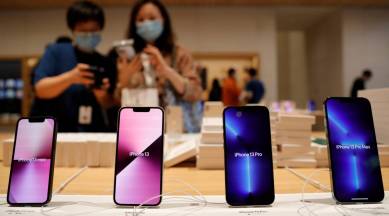India’s smartphone market sees premium segment grow, iPhone 13 top model: Counterpoint Research
Apple’s iPhone 13 was the top smartphone model in 2022 in India, according to Counterpoint Research. But overall the Indian smartphone market saw a 9 per cent decline this year.

The Indian smartphone market declined sharply in 2022. However, the premium segment saw double-digit growth, according to Counterpoint Research’s latest report, echoing similar sentiment as seen in an earlier Canalys report. Interestingly, Apple’s iPhone 13 was the top smartphone model in 2022, notes Counterpoint.
Smartphone market declines, ASP growing
The Counterpoint report notes two significant trends in the Indian smartphone market. The first is that there was a “decline in entry-level and budget segments” as these phones faced “supply constraints at the beginning of the year” followed by lower demand, which in turn made things worse.
But the premium segment saw a rise (11 per cent share), leading to growth in retail Average Selling Price (ASP). Of course, macroeconomic factors were also to blame for the drop in consumer demand.
“Consumer demand started declining from the second quarter when the global economy was crippled by multiple macroeconomic issues like all-time high inflation, rising unemployment and geopolitical conflicts, affecting India’s economy as well. Inventory build-up across channels after the second quarter led to lower-than-expected shipments throughout the second half of the year, ” Prachir Singh, Senior Research Analyst said, commenting on the issue.
One reason why the consumer is also going with slightly more expensive phones is because of several no-cost EMI schemes, Buy Now Pay Later (BNPL) options, and even Samsung finance+, according to Shilpi Jain, Counterpoint Research Analyst. “Despite declining shipments, the premium smartphone market’s share kept rising in 2022 and reached 11%, the highest ever. This paradoxical trend implies that India’s smartphone market is moving from being volume-driven to value-driven. While entry-tier and budget segments were most affected, the premium segment remained immune and showed double-digit growth,” Jain said in a press release, adding that this momentum for the premium segment will continue in 2023 as well.
Apple to Samsung to Xiaomi: How individual vendors fared
According to the numbers, Samsung was the market leader in the fourth quarter (Q4) of 2022, with Xiaomi dropping to the number three spot. However, for the entire year of 2022, Xiaomi remained the market leader.
Samsung “led the India smartphone market revenue with 20 per cent share driven by its premium smartphone models, especially the Galaxy S22 series,” according to Counterpoint. Samsung also became the top 5G smartphone brand in 2022 with a 21 per cent share. It also led the affordable premium segment (Rs 30,000-Rs 45,000) in 2022 driven thanks to the A series.
Xiaomi was down to number three in Q4, with a 24 per cent year-on-year (YoY) decline. “Inventory build-up in online channels during the festive season further slowed its shipments”, according to Counterpoint. vivo was number two in the fourth quarter of 2022 and third overall in 2022. The brand’s focus on the offline market helped it grow further. It also held the second spot in 5G smartphone shipments in 2022.
Meanwhile, Apple grew 16 per cent YoY and lead in the overall premium segment (Above Rs 30,000) as well as the ultra-premium segment (Rs 45,000 or higher). Apple also stood second in terms of revenue share for 2022 helped primarily by the iPhone 13, which was a top model this year.
OnePlus also saw growth, nearly 50 per cent (YoY), which was driven by its more budget-friendly Nord CE 2 series. It captured the second spot in the affordable premium segment with a 22 per cent share. The Nord CE 2 Lite was the top-selling 5G model in the Rs 20,000 segment in 2022.
realme was down to fourth position in 2022, with a 14 per cent YoY decline. Counterpoint blames this on the brand’s “higher exposure to the sub Rs-10,000 segment, where demand was most affected.” Realme too suffered from “inventory build-up, unfavourable market conditions”, etc. OPPO maintained its fifth position overall.
Interestingly, the Transsion Group brands itel, Infinix and TECNO accounted for 12 per cent of India’s handset market and secured the third spot in 2022 overall.